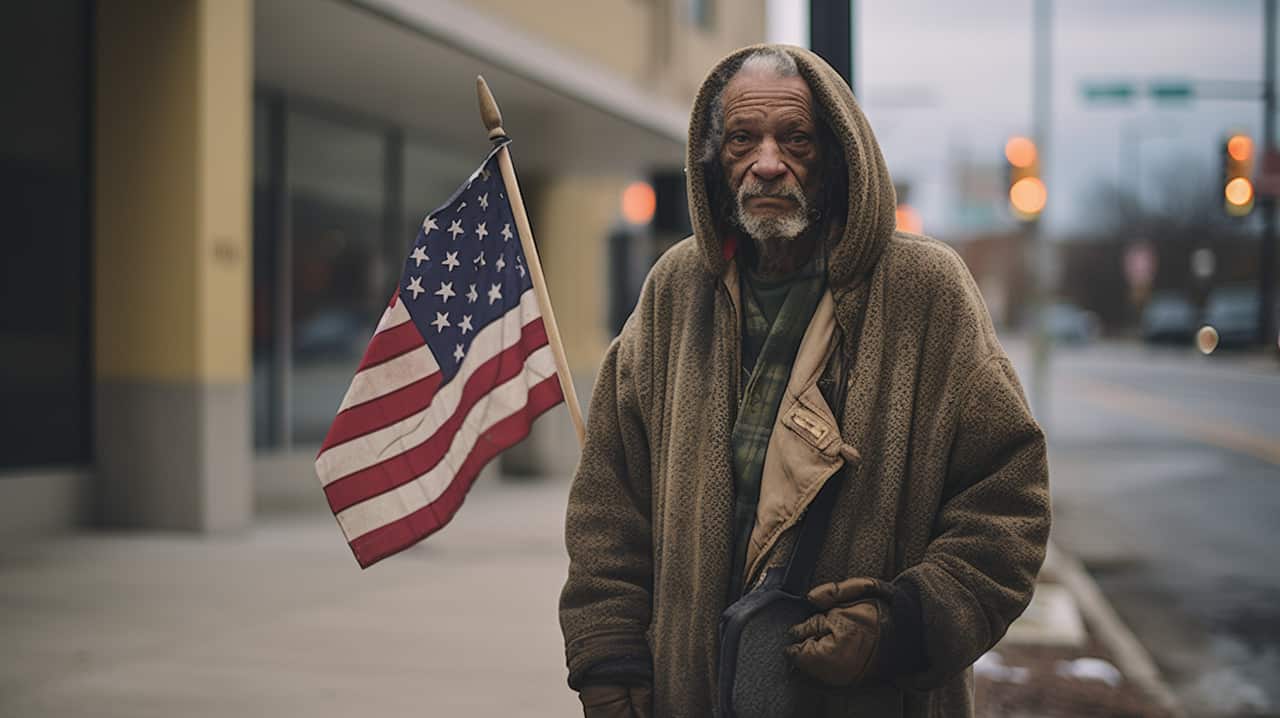Voting is the bedrock of our democracy, yet there’s one question that frequently escapes our attention – what about the voting rights of homeless individuals? If you’re anything like me, this query might’ve crossed your mind more than once.
So, I took it upon myself to dive into the depths of research and seek out answers from reliable sources like the National Coalition for the Homeless. The forthcoming blog will illuminate you on their right to vote, the challenges they confront at the polling booth, and recent legislation making strides towards alleviating these hardships.
Ready to peel back another layer of our complex democratic system today?
Key Takeaways
Homeless people can vote in all 50 states. They need to follow certain rules, like giving a location where they stay and an address for getting mail.
Homeless voters often face hard times voting. It is tough to get valid photo IDs without a fixed address or money. Some may not know how to register or get to polling places.
Laws on voting differ by state. Understanding these laws helps homeless people vote correctly even with no traditional ID.
New laws help the homeless have their say at the polls, but some haven’t passed yet. States are trying different ways so more homeless Americans can vote fairly and freely.
Table of Contents
Understanding the Voting Rights of Homeless People
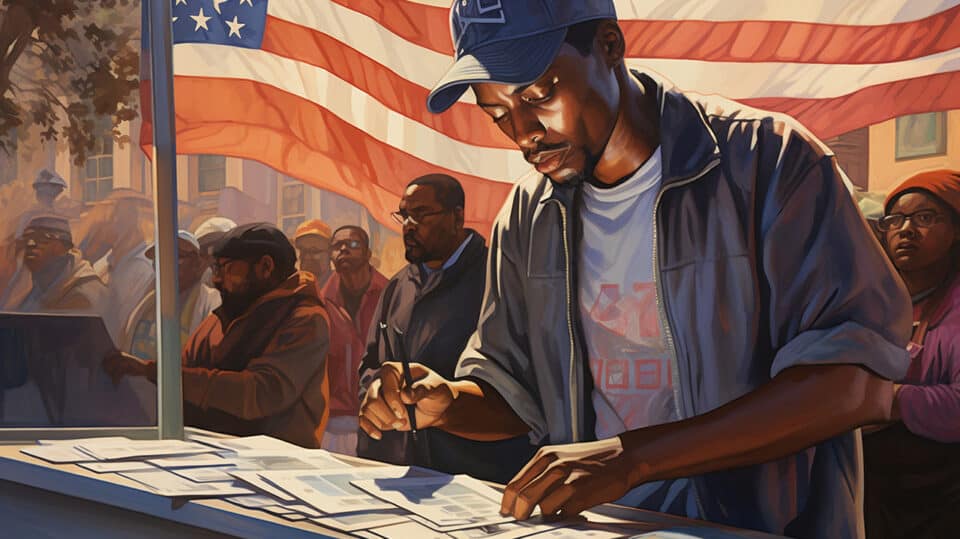
Homeless people have every right to vote, the same as other citizens. There is no law in any state that suggests that you can’t vote if you are homeless. In fact, it’s quite the opposite. All 50 states give homeless individuals the freedom to register and cast their vote.
However, there are certain rules they need to follow. One rule is about where they live. Even without a house or apartment, they still need to tell officials where they stay most of the time when they sign up to vote.
This helps decide which voting area (or “polling place”) they belong in.
Another rule is about mail. To get voter ID cards and papers on how each election works, voters may be asked for a mailing address by some states. Here’s some good news: these states often let homeless people use public places like county courthouses or clerk offices as their mailing addresses!
In short, America’s democratic system lets all U.S. citizens participate – even those without homes yet.
Legal and Practical Challenges Faced by Homeless Voters
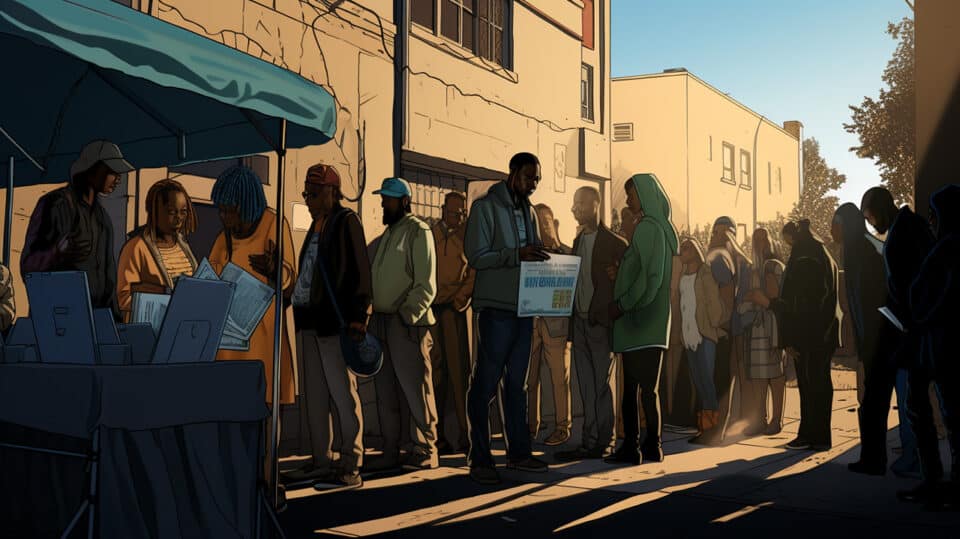
As a homeless voter, there are several legal and practical challenges you may encounter. The first hurdle is identification issues; without stable housing, obtaining acceptable forms of ID can be incredibly difficult.
Another barrier is the requirement of a mailing address for registration purposes – most states demand this, even though many people experiencing homelessness don’t have a consistent mailbox.
Additionally, navigating the complex requirements that vary from state to state – with some having strict voter ID laws while others do not – poses yet another obstacle in my path to exercising my right to vote.
These challenges not only hinder my participation but also threaten fundamental American democratic principles by excluding some citizens from casting their votes freely and fairly.
Identification Issues
Often, homeless people have trouble with IDs for voting. States often ask for an ID to vote or register. This can be hard if you don’t have a place to live. Some states let you use the address of a help group or shelter as your mailing address.
Other states let homeless people use county buildings like courthouses or clerks’ offices as their addresses.
But having no home can make getting valid photo identification tough, too. Types of accepted photo IDs usually include items like driver’s licenses, state-issued ID cards, and passports.
But these all need proof of a fixed address and cost money to get, both of which may be problems for homeless voters. Even when they manage to get these documents, keeping them safe and undamaged without a secure home is another challenge.
Requirement of a Mailing Address
Homeless voters need a place to get mail. This could be a local group that helps homeless people, a shelter, or an outreach center. They can accept mail for the voter. In some states, homeless people may use places like county courthouses as their mailing address.
Using a P.O. Box is not possible in some parts of the country. For voting rights, it matters where you live and how long you have lived there. This makes things hard for homeless people who move around a lot.
Strict Voter ID Law States vs. Non-strict Voter ID Law States
In the United States, there are strict voter ID law states and non-strict voter ID law states. These two types of states have different policies concerning the identification required to vote. As a homeless person, understanding these differences is crucial in exercising your voting rights.
| Strict Voter ID Law States | Non-strict Voter ID Law States | |
| Requirements | All voters must present a photo ID to register or vote. | Voters without an ID can sign a sworn affidavit or vote on a provisional ballot. |
| Impact on Homeless Voters | As a homeless person, obtaining a valid photo ID can present a significant challenge, potentially barring you from the polls. | Even if you’re homeless and lack a traditional ID, you can still vote by swearing an affidavit or casting a provisional ballot. This offers a more inclusive approach to voting. |
Understanding these differences can help you better navigate the voting process, ensuring that your voice is heard during the elections.
Additional Barriers to Voting for Homeless Citizens
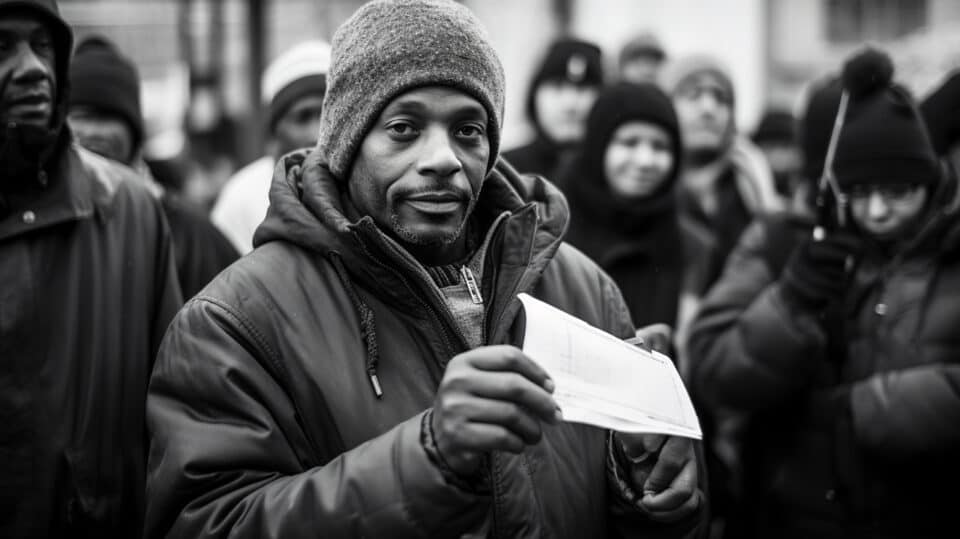
Apart from legal hurdles, homeless citizens often face other obstacles, such as a lack of transportation to polling places and inadequate knowledge of voting procedures. Discover more about these barriers and how they impact the voting rights of these individuals in our next section.
Transportation Problems
Getting to a polling place is hard for many homeless people. They may not have a car or money for the bus. This is what we call transportation problems. These issues add to the hurdles they face when trying to vote.
Sometimes, their polling place is far from where they stay during the day or their shelter at night. Even if voting times are set, it can be tough for them to get there on time. They might miss out on voting because of this problem, and others like it.
Lack of Awareness of Voting Procedures
I see many homeless people who don’t know how to vote. They don’t know they can say a park or street corner is their home when signing up to vote. They need an address so they know where to go on voting day.
Homeless folks can use the address of a place that lets them get mail, like a shelter, as their mailing spot for voting papers. But they must not use a P.O. Box in some states. Unfortunately, not knowing this may stop them from voting.
State Policies Impacting Voting Rights of Homeless People

State policies play a crucial role in shaping the voting rights of homeless people, with some states enacting friendlier laws to empower this vulnerable population. Are you intrigued? Keep reading to discover how varied legislation impacts the ability of homeless people to exercise their democratic rights.
Recent Legislation Addressing Voting and Homelessness
Laws about voting and homelessness have been talked about in many states. Here are some key ones:
- California introduced bill CA S 928. It would let homeless people use other addresses on ID papers. But, it did not pass.
- Colorado brought up bill CO S 233. It set clear rules for using the mailing address of a homeless person to sign up to vote. This law was passed.
- Hawaii had Bill H 1889 on the table. It wanted to make a bill of rights for homeless people. This would include the right to sign up to vote, but it also failed.
- Kentucky proposed bill KY H410, too. It hoped to let homeless people pick a non-traditional home for voting reasons, but this didn’t come through either.
- Tennessee presented bill H 1687, which let homeless people vote at the county election commission office if they showed proof of identity by an affidavit, yet this also did not pass.
How Legislation Can Assist Homeless Voters
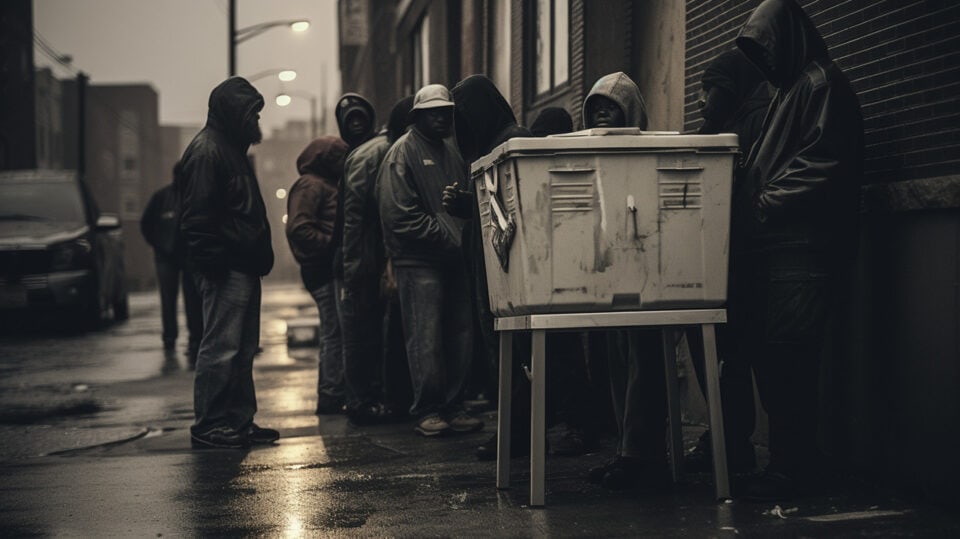
New laws are helping homeless people vote. These laws say a person does not need to live in a house to vote. This means that shelters or advocacy groups can be their home for voting.
Some states let homeless people use county offices as their mail addresses. They get voter ID cards and voting papers there. However, some states will not allow P.O. boxes for mail addresses for homeless voters.
Laws also help those who have to move around a lot due to being without homes with durational residency needs so they can still cast their votes even if they change locations often.
Conclusion
Yes, homeless people can vote. It is their right in all 50 states; they just need to know how to register and meet the rules of their state so they, too, can have a say in who runs our country.
Frequently Asked Questions About Homeless Voters
Can a homeless person register to vote?
Yes, homeless people can register to vote. In most states they meet residency requirements by using the location of where they sleep as their address.
What do homeless people need for voter registration?
Homeless people often use a legal ID number like social security or a voter ID number for voter registration and can provide places like shelters as mailing addresses.
Is there any help for homeless people to vote?
The Help America Vote Act (HAVA) lets first-time registrants cast provisional ballots if they don’t have identification, such as bank statements or utility bills.
Are there any problems that stop homeless people from voting?
Sometimes, agencies resist helping with Voter Registration Drives or Candidate Forums on Housing and Homelessness due to legal issues or lack of resources.
How do state laws affect voting rights for the homeless?
State-by-state charts show different rules about ID needs, how soon one must live in the state and more factors that change how each state handles homelessness and voting.
Do all states allow same-day registration and early voting for homeless citizens?
Some states let voters sign up on election day, while others require prior sign-up times; some states also offer absentee ballots or early voting options.
